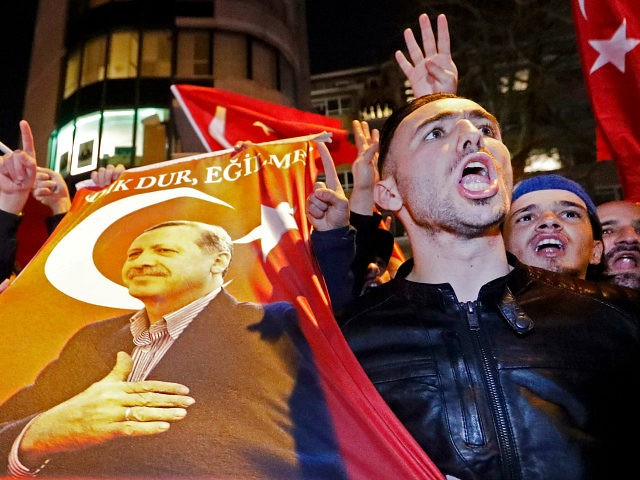A mob of supporters of Turkish President Recep Tayyip Erdogan congregated Sunday to squeeze and mutilate oranges as a protest against the Netherlands, which has prevented Turkish government officials from attending pro-Erdogan rallies on Dutch soil.
Members of the Islamist Justice and Development Party’s (AKP) youth wing took the streets of Koaceli this weekend, the Turkish newspaper Hurriyet reports, “squeezing oranges and drinking the juice” as a warning to the Dutch that Turkey will have its revenge for their refusal to allow Islamist rallies in support of Erdogan. Orange is the color of the Dutch royal family and many Dutch wear it as a symbol of national pride.
The congregated mob repeated Erdogan’s own accusations of “fascism” and “Nazism” against the Dutch, calling the nation as worthless “as an orange peel.”
“The Netherlands, which has brought humanity below sea level, like its own land, is a fascist country and blocked our minister from meeting our voters,” an AKP youth leader told Hurriyet.
Amsterdam prevented both Turkish Foreign Minister Mevlüt Çavuşoğlu and Family and Social Policies Minister Fatma Betul Sayan Kaya from attending rallies in the Netherlands, refusing to grant permission for their planes to land in the country and citing the security risks inherent in Turkish Islamist government assemblies. The Netherlands experienced a wave of violent Islamist protests following the incident.
The AKP has an ample recent history of violence within Turkey. AKP members have attacked their peers in the Turkish parliament with both bare hands and legislative props like gavels in disagreements about Erdogan’s proposed expansions of executive power. When they have not engaged in violence against critics, AKP legislators have openly regretted not doing so, encouraging mobs to form against opponents.
In 2015, following a massive government crackdown on opposition media, mobs of Islamists agitated by the AKP’s rhetoric (and, in one case, accompanied by at least one AKP politician) attacked the Hurriyet headquarters on two separate occasions, stoning the outside, and attempting to enter the offices and attack journalists while shouting, “Allahu Akbar.” Hurriyet columnist Ahmet Hakan, who has often expressed skepticism of Islamism, was hospitalized in October 2015 after being beaten by a mob while walking to his car.
With hundreds of opposition media outlets shut down, Erdogan’s government is better positioned to make the case to Turks for a presidential system, which would grant Erdogan unprecedented executive power in the history of modern Turkey. Çavuşoğlu and Kaya both traveled to the Netherlands attempting to attend rallies to promote a “yes” vote in the referendum which would change the executive system on April 16.
Yeni Safak, a pro-Erdogan newspaper with a reputation for hyperbole, has taken the lead in antagonizing Amsterdam. Columnist İbrahim Karagül, for example, repeatedly condemns an unnamed “they” in an article claiming the Netherlands supported the coup attempt against Erdogan in July 2016. “They are attacking because they could not get our country to kneel with tanks and cannons, because they could not drag it in to civil war, because they could not stop its great transformation, because they feel Turkey’s strength,” he writes. “The Netherlands is the hitman here – the first to shoot. It is the first open victory of the wave of fascism that has started to take Europe hostage.”
“The whole world knows that a win for the ‘yes’ votes is one of the most critical stages of the great transformation in Turkey, that as of April 17, it will not be possible to stop Turkey, but a kind of crusader front stands up against us,” Karagül concludes, clearly implying that a vote against Erdogan is a vote for the “crusaders,” echoing the language of the Islamic State, which has called Erdogan himself a “beggar” before “crusader Europe.”
Early polls indicated that Erdogan’s supporters turned to such charged language in response to a general distaste for the referendum power grab. Polling firm Gezici found in early February that 59 percent of Turks were planning on voting “no” in the April referendum. As many as 35 percent of AKP voters said they, too, would vote “no.” By the end of the month, the pro-Erdogan outlets Sabah reported that polls were showing a plurality of support for the “yes” side.
To guarantee a victory, however, Erdogan has turned towards the Turkish population of Europe, who will not suffer the day-to-day consequences of living under Erdogan’s consolidated rule. In Germany, Turks widely favor the AKP; Financial Times notes that 60 percent of German Turks voted for the AKP in the 2015 parliamentary elections. Those 1.4 million voters could prove pivotal for the April 16 referendum.

COMMENTS
Please let us know if you're having issues with commenting.